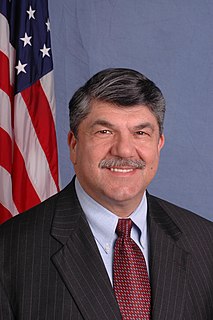Top 518 Workplace Quotes & Sayings - Page 9
Explore popular Workplace quotes.
Last updated on November 16, 2024.
We are trying to identify employers that might be [hiring illegal aliens] and to take effective action against them. We're trying to make sure that employers that want to cooperate have a system whereby they can verify the employment status of a person that they are seeking to hire. It is part of a comprehensive initiative in which we look both at the border, at the workplace, at criminal aliens, in an attempt to have a comprehensive effort aimed at stopping illegal immigration while at the same time promoting legal immigration according to principles of due process.
We face a campaign of fear and division every day at the workplace or every time we try to organize a work site. We're able to get through that by talking through the facts and having people join together. Donald Trump, I will say three things about Donald Trump. One, he's unfit to be president. Two, he would make it much more difficult for working people to make ends meet. And, three, he would tear our country apart.
In the budget I will present to you, we will try to do more to speed the deportation of illegal aliens who are arrested for crimes, to better identify illegal aliens in the workplace as recommended by the commission headed by former Congresswoman Barbara Jordan. We are a nation of immigrants. But we are also a nation of laws. It is wrong and ultimately self-defeating for a nation of immigrants to permit the kind of abuse of our immigration laws we have seen in recent years, and we must do more to stop it.
Thing that we wanted to do was redefine what a green job was, what a climate job was. We said: "Wait a minute. There's all these people out there who are doing low-carbon work." It's not just guys in hard hats putting up solar panels. Teaching is low carbon. Caring for the sick is low carbon. Daycare is a green workplace. Overwhelmingly, this is work that is done by women, overwhelmingly women of color, on the frontlines of austerity clawbacks.
The technologies that will be most successful will resonate with human behaviour instead of working against it. In fact, to solve the problems of delivering and assimilating new technology into the workplace, we must look to the way humans act and react. In the last 20 years, US industry has invested more than $1 trillion in technology, but has realised little improvement in the efficiency of its knowledge workers and virtually none in their effectiveness. If we could solve the problems of the assimilation of new technology, the potential would be enormous.
From what I understand from talking with older friends and feminists, I think that once I enter the workforce and start to think about marriage and having children, my gender will probably eclipse my feminist identity in terms of marginalization. Discrimination in terms of hiring and in the workplace are still real according to statistics. I also think, as a feminist, figuring out what a relationship based on true and complete equality is will be a challenge. But hopefully by the time I'm dealing with those issues feminists will have made great progress in all of those areas.
Economists and workplace consultants regard it as almost unquestioned dogma that people are motivated by rewards, so they don't feel the need to test this. It has the status more of religious truth than scientific hypothesis. The facts are absolutely clear. There is no question that in virtually all circumstances in which people are doing things in order to get rewards, extrinsic tangible rewards undermine intrinsic motivation.The bonus myth: How paying for results can backfire The world is a dangerous place, not because of those who do evil, but because of those who look on and do nothing.
The most important lesson of all: Go home. Make time for the ones you love. The easiest thing to think about living like an entrepreneur is that these skills apply to only one part of your life: your job. That's a mistake. In the same way that entrepreneurs are redefining many of the traditional rules of the workplace, they're also helping to break down one of the most stubborn boundaries of all, the one between work and family. While it's popular to say you can have either a successful career or a meaningful personal life, I'd like to suggest you can aim for both.
When people are in a workplace where it's possible to organize and engage in labor actions, that's how they fight, and it can be very effective. When people are not in that situation, they fight in other ways. They fight in the marketplace. One need only notice that there's been a meaningful shift in where people are over the last thirty, or fifty years from traditional productive industries toward a kind of work that involves circulation of capital and products, and toward unemployment. People who are in that situation are unlikely to fight somewhere else.
The most unacknowledged spending expectation among women is the amount of time spent by single mothers caring for children, not only physically, but psychologically. It is my feeling that only a small percentage of a mother's time is normally compensated for by child support, given what a woman could make adding these hours to workforce hours. It is why women who have never been married and never had children earn so much more in the workplace than women who have had children.
While the President [Barack Obama] did a good thing when he said he personally supported equal marriage, he then quickly backed away and said that he wasn't going to do anything about it - that it was a state matter, and that he wasn't going to interfere, as opposed to being than being a real advocate for equality across the board in marriage. He also, I think two weeks prior to that statement, refused to sign an executive order to establish equal rights in the workplace for the LGBT community.
[Trump's worldview states] that, for example, women are incompetent as compared to men in business settings. That women in general are intellectually inferior and have to make up for that by using their sexuality to get ahead. That women of color are angry, irrational, lazy, and always ready to get into a fight for no reason. That men in the workplace can say incredibly racist and sexist things, and as long as they make more money than their competitors, the racist and sexist things they say and do are totally acceptable.
I also think that employees these days expect less of a separation of work and personal life. That doesn't mean that work tasks should encroach upon our personal time, but it does mean that employees today expect more from the companies for whom they work. Why shouldn't your workplace reflect your values? Why is "giving back" not a part of our jobs? The answer for us is to integrate philanthropy with work.
I consider myself conscious of how women are treated, and sometimes I can be a feminist. Sometimes I'm a little Republican, sometimes I'm a little Democrat. Sometimes I'm angry, sometimes I'm not angry. I'm not a total feminist, but I believe in rights for females. I believe that if we have to pay 100 percent for our college tuition, and then we get into the workplace and we're only given 70 percent of our counterparts' salaries, then we shouldn't have to pay but 70 percent of our college tuition. Maybe that'll stop the bullshit.
Although our grammar schools are teaching a whole generation computer language to adjust to the technological needs of a Stage II [post survival-focused] society, we have neglected to teach this generation relationship language and conflict resolution skills to address the social and psychological needs of a Stage II society. And when it is taught, in countries like Germany, although called social competence it focuses on workplace teamwork - still on survival, breadwinner oriented work goals.
Worker-owned co-ops, on their own, floating in the market, tend to replicate the behavior of worker-owned capitalists in some circumstances. They sometimes develop positive participatory schemes, sometimes not. We know from the studies of worker-owned plywood companies in the US, they can tend to develop conservative attitudes, not socialist attitudes. So even though I'm an advocate of further democratization of the workplace, we also need to be building larger structures.
I have no statistics to prove it, but I'm sure the American workplace will be adversely affected on Monday, the day after XXIV. The game will be the focus of conversation, and distractions happy and sad will be the order of the day, not to mention millions of hangovers. I wouldn't buy a toaster or a parachute manufactured the day after Super Bowl XXIV. You cannot engender such torrid anticipation for an event so great that it requires Roman numerals as a suffix, then expect there to be no social repercussions at its end.
What business needs now is exactly what women are able to provide, and at the very time when women are surging into the work force. But perhaps even more important than work force numbers is the fact that women - who began this sweeping entry in the mid-seventies - are just now beginning to assume positions of leadership, which give them the scope to create and reinforce the trends toward change. The confluence is fortunate, an alignment that gives women unique opportunities to assist in the continuing transformation of the workplace.
We have come a long way, particularly in terms of women becoming more equal under the law. Fortunately, workplace discrimination is now a crime - but unfortunately women still experience it. Fortunately, sexual harassment is now a crime - but unfortunately women still experience it. Fortunately, the assault of women is now a crime - but unfortunately women still experience it. The list goes on.
Most women without children spend much more time than men on housework; with children, they devote more time to both housework andchild care. Just as there is a wage gap between men and women in the workplace, there is a "leisure gap" between them at home. Most women work one shift at the office or factory and a "second shift" at home.
The Common Core State Standards Initiative is an important step forward in ensuring that the United States remains competitive in the global economy. Career technical education (CTE) shares the Initiative s goal that all students must be college and career ready. CTE programs that incorporate the Common Core Standards will ensure students have the academic and technical knowledge and skills to be successful in the 21st century workplace.
A new world of complex relationships and feelings opens up when the peer group takes its place alongside the family as the emotional focus of the child's life. Early peer relationships contribute significantly to the child's ability to participate in a group (and in that sense, society), deal with competition and disappointment, enjoy the intimacy of friendships, and intuitively understand social relationships as they play out at school, in the neighborhood, and later in the workplace and adult family.
The first major issue you need to consider when focusing on today's workers: You have to know what motivates them. If you think it's primarily money, think again. The biggest single change in the workforce of the entrepreneurial age is the list of priorities workers bring to the job. Except paycheck there are new considerations: impact, freedom, quality of life. Employees today have higher expectations; they are looking for what I call "psychic equity". Make your workplace more entrepreneurial and flexible or find your workers fleeing to launch enterprises of their own.
Comics are reflective of what's going on in larger culture. Wonder Woman came to be in her position when women were first entering the workplace in numbers during the war. Then Wonder Woman had another rise in the '70s when Gloria Steinem latched on to her as an icon for the [feminist] movement. I think we're seeing another wave of feminism today, a fourth wave characterized by intersectionality and the internet. And I think it falls right in line that we would see another wave of superheroines coming to the fore.
A spiritual partnership is a partnership between equals for the purpose of spiritual growth. Nothing like this archetype has existed before because nothing like this was required before in the human experience. And spiritual partnerships can be created in a biological family, they can be created among friends, they can be created in the workplace, they can be created anywhere that two or more individuals are committed to their own spiritual evolution and are striving to relate to each other as equals.
We have become the new american slaves: but there is a revolution coming. It is a revolution of individual liberty. It will free us without violence. It will begin with the self. It will spread to the workplace. It will turn our corporate masters into our servants. It will free us of government's tyranny. The revolution will spread to all corners of the nation, and at last, we shall be free.
I feel that at this point in our country's history, it is important that we not reverse marriage equality, that we not reverse Roe v. Wade, that we stand up against Citizens United, we stand up for the rights of people in the workplace, that we stand up and basically say: The Supreme Court should represent all of us. That's how I see the court, and the kind of people that I would be looking to nominate to the court would be in the great tradition of standing up to the powerful, standing up on behalf of our rights as Americans.
I think what is being pointed out by African-Americans is that from slavery forward they have been living in a supposed democracy which treats them as less than other citizens, less than whites in the society. And I think that pointing out that there are structures of discrimination in the society, deeply rooted racist structures, that segregate housing, that send black children to ill-equipped schools, that discriminate in the workplace - these are truths about our society that must be faced.
The only advice that I know to give is to pray for your leaders. Whether you like it or not, we have a new president. As a church body, we need to remember these leaders, whether they are in office or not. Leaders in the workplace or the church, we need to remember them because they face some really hard decisions. So we need to pray for wisdom and peace and understanding and for patience, and for any and everything really because they're going to need it. So let's just gather around them and pray that God's will be done on earth, versus someone's agenda.
During the years I was on the board of directors of the National Organization for Women in New York City, the most resistant audiences I ever faced in the process of doing corporate workshops on equality in the workplace were not male executives - they were the wives of male executives. As long as her income came from her husband, she was not feeling generous when affirmative action let another woman have a head start vying for her husband's (her) income.
Did you see, after this horrific tragedy in Boston, that [Barack] Obama cannot utter the word 'terrorist.' It's not politically correct. He even called the Fort Hood murderer 'workplace violence.' Because it's politically incorrect to talk about 'jihad,' or to talk about 'terrorist,' or to talk about 'the war on terror.' He won't say those words, because they're politically incorrect.
I do interview senior candidates at the home office or many of our hotel or restaurant General Manager candidates. My two favorite questions are "Tell me about a failure in your career, what you learned from it, and how you've leveraged this lesson" and "All of us are misperceived at one time or another. What's the most common way you're misperceived in the workplace and why?" Both of these questions require a certain amount of self-awareness and a willingness to not give pat, normal answers that we offer experience in interviews.
Create sacred spaces in the workplace as well. Classrooms, five years ago, professors would say, I don't want be a nanny to my students. They can do whatever they want. Now professors are saying, put away that laptop, because studies show that it not only takes away the attention of the person who's on the laptop from the class, but everyone around them. There's like a circle around that person that's distracted and not paying attention.
I ask you, how would you like your mom, your wife, your daughter to spend $100,000 to go to Harvard or some state school, and go out into the workplace, and you know she's great, and men are getting paid $200 per week more than her? Would that piss you off? What if you lost your job and you stay home crippled while she goes out, and she thinks she's going to get a good job, but someone male with the same level of experience and the same level of education gets paid more than her? You're going to get pissed. Until you walk a mile in someone else's shoes, I don't want to hear it.
We've long known that firms can pay higher wages if they spend less on workplace safety enhancement. Libertarians ask, "If a worker is willing to accept higher wages in return for his agreement to exercise greater caution while performing his job, why should the government prevent him from making that choice?" It's a rhetorically powerful question, yet it overlooks the fact that the agreement in question will have adverse effects on others.
It is easy to underestimate how much there is a growing awareness that there is a deep sexism in politics, there is a deep sexism in the workplace generally in America and Donald Trump has come to signify that and Hillary Clinton has come to signify the women that have to work hard, prepare more, show up earlier and go home later, work twice as hard to get the same results as men do in the same game.
We, the people, gave the marching orders to our democratically-elected officials and instructed them. We wanted out of Vietnam and we got out of Vietnam. We wanted women's right to choose and we got women's right to choose. We got the EPA, we got the Clean Air Act, Water Act, we got rights for workers in the workplace to be protected from dangers. We accomplished pretty much all of what we wanted when we had the courage of our convictions. That is the missing ingredient.
































